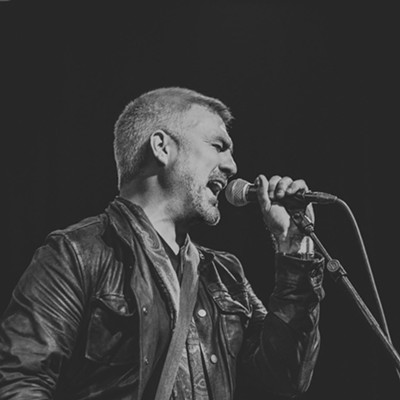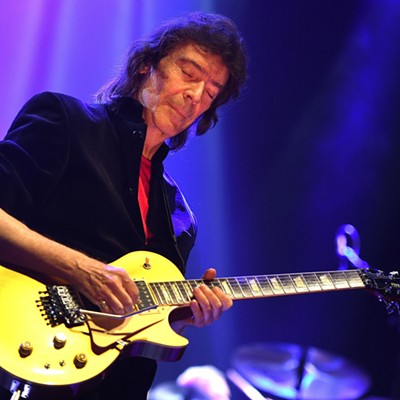When the needle comes to the end of the record and the turntable falls silent, what remains is the room, with its own sounds and ambience.
On his latest album, Naïm Amor set out to capture that feeling of focused listening, the feeling of being absolutely present and connected with music, sounds and your surroundings.
"When you turn the music off, you can hear the walls, the sound of one specific place, its nude ambiance that makes it so unique. This album fits the moment and the place when you decide to finally turn the music on again ... and listen," Amor says.
Hear The Walls, released Nov. 25 on Fort Lowell Records, is what Amor offers as the antidote to modern overload. It's all too common to feel distracted, lost, confused and overwhelmed, Amor says, which makes the acts of creating and listening to music more important than ever.
"It seems like sounds are competing constantly," Amor says. "It's almost like a riot of people who want to get on top of the pack. I imagine people trying to compete by being louder, more this or more that. For me, what I wanted to do on this record is less of everything."
The concept of the title came from shutting out the excess, turning away from too loud music and drawing the listener in to a place that requires calm and attention.
That idea permeates the songs themselves. In "Turn The Magic On," Amor sings "Turn the music off, then you'll hear the walls / Their stories, their thoughts and yourself after all / treasures hang around everywhere, if you watch."
"Musically, I've known for a long time I wanted to express that dimension. I thought it was an album that's very quiet. Very dynamic, but quiet. The idea of Hear The Walls, if you turn the music off, you can feel the walls, you can hear them," Amor says. "Instead of always being covered by background noise, music and TV and all those distractions. From there, that's how I wrote the songs, all around that theme."
Hear The Walls represents yet another side of the always-evolving, multi-talented musician. Born in Paris, Amor moved to Tucson in 1997. He regularly performs in jazz combos, with rockabilly legend Al Foul and showcases his own compositions in various groups. As a recording artist, Amor also composes film soundtracks and instrumental works as imagined film soundtracks.
On Hear The Walls, like his prior records Dansons and Sanguine, Amor sings in both English and French, combining the two languages like he combines the wealth of musical influences he's absorbed over the years.
"I'm from a family of musicians. Music for me started as a kid, a family reunion kind of event. It's not a show. It's after a good dinner, with all your cousins and uncles and aunts and grandparents, there's music and we all play," Amor says. "For me, music first is sharing a moment with the people you play with. It's a party. It's a shared potluck. It's absolutely not for an audience. I remember being very proud as a kid. We were doing our best to make it beautiful. It has nothing to do with being good music or bad, it has everything to do with sharing this moment."
Amor started playing the violin and got into the guitar randomly because he liked the look of the instrument.
"My cousin had a beautiful guitar and he showed me three chords and I could play basic rock 'n' roll when I was 13," he says. "Now I'm more of a guitar player than violin. Violin is an instrument you can't stay away from for very long.
"Playing guitar is so fantastic, so amazing. For me guitar is a companion. Because you put so much effort working on it, challenging yourself, you're craving sitting down with your guitar and learning a tune or figuring out something. I love that. But it takes effort to reach that place where it becomes a real dialogue."
From his early rock 'n' roll education, Amor got deep into rockabilly and then discovered bands like The Cramps and veered more into psychobilly and punk, digging through specialty record stores in Paris for Minor Threat and Sonic Youth records. But even through all that, he always listened to a lot of jazz, as well as classical, mod rock, pop and soul.
"I feel like in every music, there's a common path, but it's expressed differently. To me, there's no real or fake jazz, or things like that," he says. "There's just people who are doing something that integrates some drama, something in the record that's the here and now."
Amor just returned to Tucson from a three-week trip back to France.
"I found my records from my teenage years, my records even from when I was a kid. I brought some for my son. They're in French and I want my son to hear them. I realize those records were absolutely fantastic, recorded with real orchestras. The music is from the late '60s and early '70s and the compositions are absolutely amazing. I was listening to this kind of stuff when I was very little. I've always liked those orchestrations and the sophistication of the music of that era," he says.
"For me, I like albums although they are kind of challenged these days. The market and the views of consumption of music have completely changed. The concept of albums is an old concept, but for me they make sense," Amor says. "It's not a nostalgic thing. You gather some work and if you put the songs together, they have their own logic. They make sense and they witness a chunk of your life, a year or two of your life."
Amor approached Hear The Walls, like his other projects, with little in the way of preconceived notions about how the project would turn out.
"It's pure necessity when I decide how an album should be. It's about who am I playing with these days, what can I afford to do as far as how many musicians to play with, all very pragmatic questions," he says. "On this album, I wrote some songs for a different project and a film project. I'd put these ideas aside and thought they could be good for a song. Really half came from compositions I had for other projects."
Working with Thøger Lund of Giant Sand on upright bass, Amor sketched out the songs and decided that on a guitar-focused album, he'd create a variety of tones by using a variety of guitars, with only one amp and no effects.
"I have a pretty large collection of guitars and I decided for once to really use as many guitars as I could. Every song has a different guitar," he says.
Amor and Lund recorded the album directly onto tape, live, in a minimal set-up at Waterworks Studios. Jim Waters produced and mixed the album.
"I like the process of really forming something and not putting things together on a computer," he says. "I like the delivery of a performance. There's something more dramatic. To me, it has more to do with life. I like that aspect in music. To say something, you have to say it now."
Amor recorded strings afterwards, himself and Ben Nesbit on violin, and sprinkled in some percussion from Thomas Belhom and piano from Heine Hanson.
"I had the intuition that rhythm has nothing to do with things that are nailing your brain. Hear The Walls has lots of rhythm and is very dynamic, but nothing is up to the roof any more. Things go loud but also very, very quiet and the difference between the two is huge," Amor says. "When you get into that universe, you realize there's a lot to hear and a lot of diversity.
"I'm so against quiet meaning sleepy or boring. We need to be able to listen. You can't just read a certain book in the middle of maelstrom of noise. Some books you need to read with focus and then they're amazing. The same with music. There's so much music you just can't hear in a bar. You need to listen when it's not just background music.
"I don't listen to music that often. When I come home, I don't put music on the background, ever. When I want to listen to something in particular, I fee like I'm doing something I can pay attention to and not have it as a hum in the background. That has nothing to do with the quality of the music. It's the quality of the listening experience. To me that is very important," Amor says. "Music is available absolutely 24/7 now. We don't question music in a bar. It's just there because you have to have something. But why? The question of the why needs to resurface a little bit.
"My quality of listening is going to be more focused. Most people will listen to music in their car constantly, or at home they put on Pandora or whatever. But I defy them to tell me what they think and feel about whey they heard in the last hour," Amor says.
He compares music with food ("I don't like snacking") and relationships ("people should not be checking their phones constantly"), saying people shouldn't be afraid of a little boredom because "It's important to do less."
"I know some friends who are DJs," Amor says. "They're real music lovers and I feel a lot in common with them when we talk about music. They're really into the listening and really into all kinds of music. They have this acute perception about music and the meaning of it. I feel like that too."







